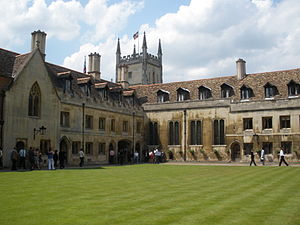Pembroke Hall, Cambridge
| Pembroke College | |
|---|---|
 |
|
 |
|
| University | Cambridge University |
| Location | Trumpington Street (map) |
| Full name | The College or Hall of Valence Mary (commonly called Pembroke College) in the University of Cambridge |
| Founder | Marie de St Pol, Countess of Pembroke |
| Established | 1347 |
| Named for | Aymer de Valence, 2nd Earl of Pembroke |
| Previous names | Marie Valence Hall (1347-?) Pembroke Hall (?–1856) |
| Sister college | Queen's College, Oxford |
| Master | Chris Smith, Baron Smith of Finsbury |
| Undergraduates | 442 |
| Postgraduates | 264 |
| Boat club | www |
Pembroke College is a constituent college of the University of Cambridge, England. The college is the third-oldest college of the university and has over seven hundred students and fellows. Physically, it is one of the university's larger colleges, with buildings from almost every century since its founding, as well as extensive gardens.
As of 2014[update] the college has a financial endowment of £67 million. Pembroke has a level of academic performance among the highest of all the Cambridge colleges; in 2013, 2014 and 2016 Pembroke was placed second in the Tompkins Table.
Pembroke is home to the first chapel designed by Sir Christopher Wren and is one of the six Cambridge colleges to have educated a British prime minister, in Pembroke's case William Pitt the Younger. The college library, with a Victorian neo-gothic clock tower, is endowed with an original copy of the first encyclopaedia to contain printed diagrams.
The college's current master is Chris Smith, Baron Smith of Finsbury.
Marie de St Pol, Countess of Pembroke (1303-1377) founded Pembroke College, Cambridge. Christmas Eve 1347, Edward III granted Marie de St Pol, widow of the Earl of Pembroke, the licence for the foundation of a new educational establishment in the young university at Cambridge. The Hall of Valence Mary ("Custos & Scolares Aule Valence Marie in Cantebrigg'"), as it was originally known, was thus founded to house a body of students and fellows. The statutes were notable in that they both gave preference to students born in France who had already studied elsewhere in England, and that they required students to report fellow students if they indulged in excessive drinking or visited disreputable houses.
...
Wikipedia
